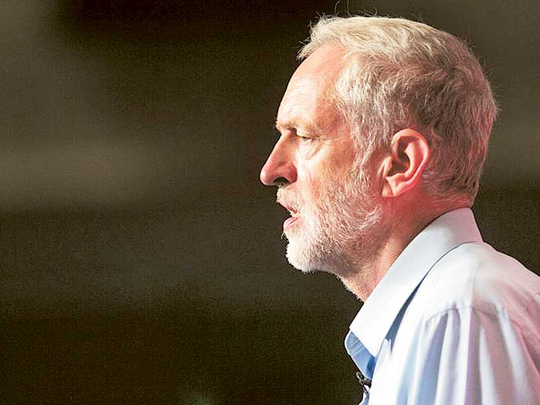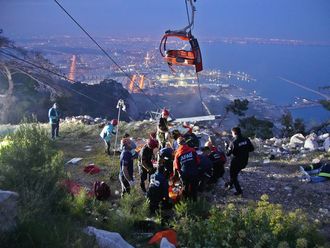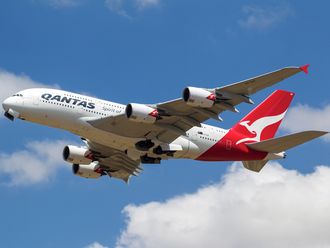
London: Under Jeremy Corbyn, its new leader, Britain’s Labour Party is virtually tearing itself apart over whether to support the government’s call for participation in air strikes against Daesh in Syria, as well as in Iraq.
While the issue itself is important, it is proving almost existential for a Labour Party run by Corbyn, a man of the far left who has been a critic of Western military intervention in nearly every conflict for the last half-century.
Corbyn, elected as leader by Labour Party members and supporters after the party’s severe electoral defeat in May, opposes British military involvement in the fight against the Daesh in Syria, questioning its legality and strategic utility. Corbyn is popular among rank-and-file party supporters, some of whom he has re-energised, but he has little support among Labour’s 231 members of Parliament, some of whom regard his election as a bizarre accident.
Many among Labour’s parliamentarians favour the position of the Conservative prime minister, David Cameron, who wants authorisation for military action in Syria. He made the request after Daesh claimed responsibility for the massacre of British tourists on a Tunisian beach in June, as well as the attacks in Paris on November 13; the destruction of a Russian airliner over Egypt on October 31; and the beheading of British captives in Syria.
The conflict with Corbyn over foreign policy, brewing since his election, has boiled over into an acidic mess. Senior Labour members of the shadow Cabinet, who would hold ministries if the party were in power, are threatening to resign. And Corbyn’s supporters — including the leader of Britain’s most powerful union, Unite — are warning ominously that members of Parliament who oppose him are risking their careers.
In private, some Labour members of Parliament on the right of the party barely conceal their disdain for their leader. “Margaret Thatcher lost power because she couldn’t command the support of many more than a couple of hundred of her MPs,” said one senior Labour Party figure, speaking on the condition of anonymity to avoid the wrath of the leadership. “Corbyn has about 10 of his.”
Asked whether the mood in the parliamentary party was gloomy, another lawmaker, who also requested anonymity to speak candidly about party affairs, responded, “It isn’t gloomy; it’s terrible.”
To forestall what the BBC’s political editor, Laura Kuenssberg, called a “car crash” with the shadow Cabinet, Corbyn, while making clear that “Labour policy” was opposed to air strikes in Syria, decided Monday to allow his legislators a “free vote” — meaning they can vote however they like on the question.
A free vote makes it much more likely that Cameron will get his authorisation. The prime minister has said he wants to ensure “a clear majority” before he calls one, having lost a vote in 2013 over bombing Syria for its government’s use of chemical weapons. On Monday evening, he announced a single day’s debate and a vote on the issue to take place Wednesday.
To back Corbyn’s point that the party’s supporters were on his side, his office on Monday released what it said was a random sampling of the 64,771 confirmed Labour Party members who responded to Corbyn’s emailed request for their views. Judging from the sampling of 1,900 responses, the party said, 75 per cent opposed British air strikes in Syria, 13 per cent favoured them and 11 per cent were undecided. The results are hardly scientific, but seem indicative of the mood of Corbyn’s supporters.
So the essential problem — the gap between legislators and their leader — is hardly resolved. Len McCluskey, the general secretary of Unite who was important in Corbyn’s victory and provides significant funding to the party, warned that Corbyn’s opponents were “writing their political obituaries” and that they should not use Syria as “the thin edge to stage a coup.”
One problem confronting rebels is the lack of an obvious alternative to Corbyn, although Hilary Benn, the foreign affairs spokesman, and Tom Watson, the deputy leader, have been mentioned.
The bigger difficulty is Corbyn’s strong support among members. “If Jeremy were to step under a bus, the membership would want to select him again, or someone with a similar perspective,” one of the Labour lawmakers said. Even if a method could be contrived to oust Corbyn and keep him and his few supporters in Parliament off the ballot for his successor, the backlash would be ferocious, he added.
Many Labour lawmakers believe that this degree of support needs to be eroded before any challenge is likely to succeed. That could happen if Labour starts to perform badly in coming electoral tests, the first of which is a by-election in Oldham West and Royton on Thursday.
In that contest, precipitated by the death of the sitting lawmaker, Labour had an emphatic majority in May’s election, but is facing a challenge from the right-wing, populist UK Independence Party.
Next year, elections are due for the Scottish Parliament, Welsh Assembly and London mayoralty, and the performance of Labour under Corbyn will be watched closely.












